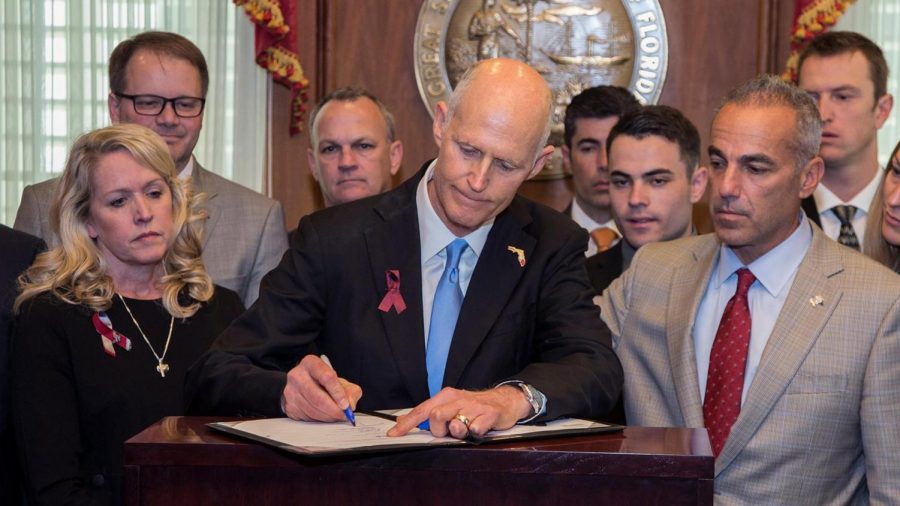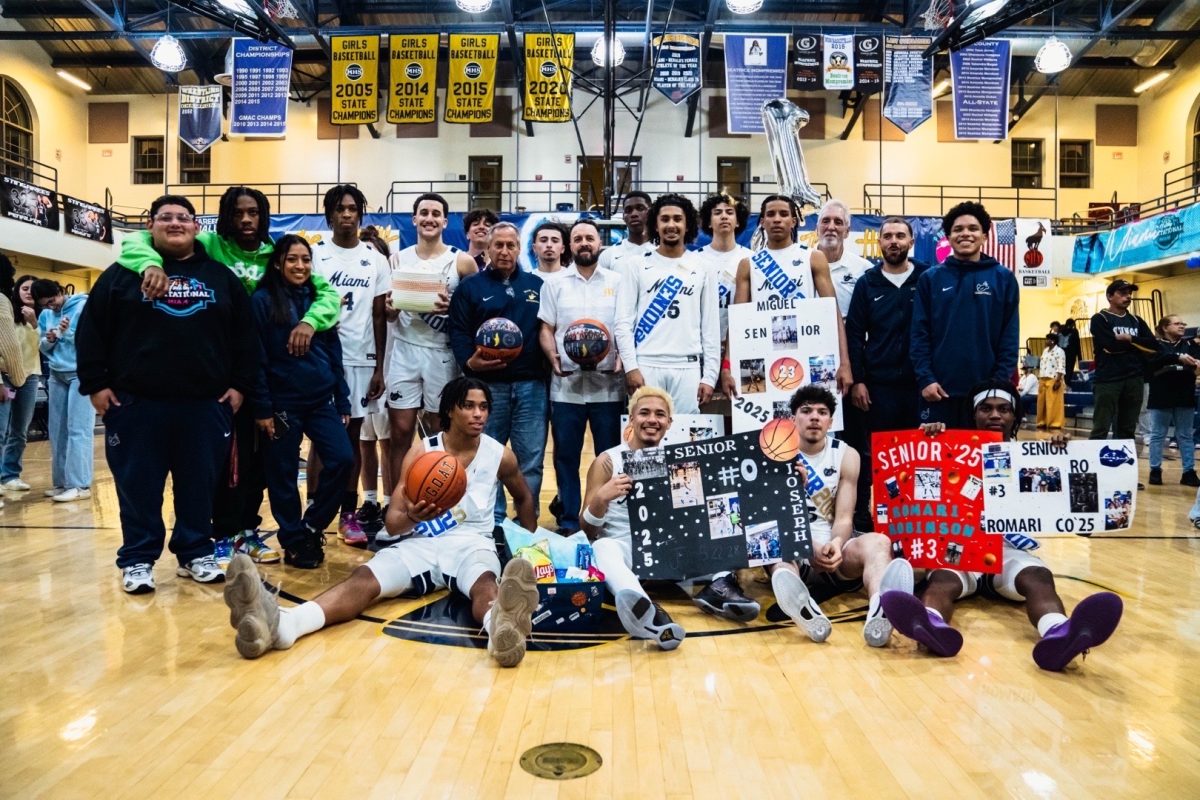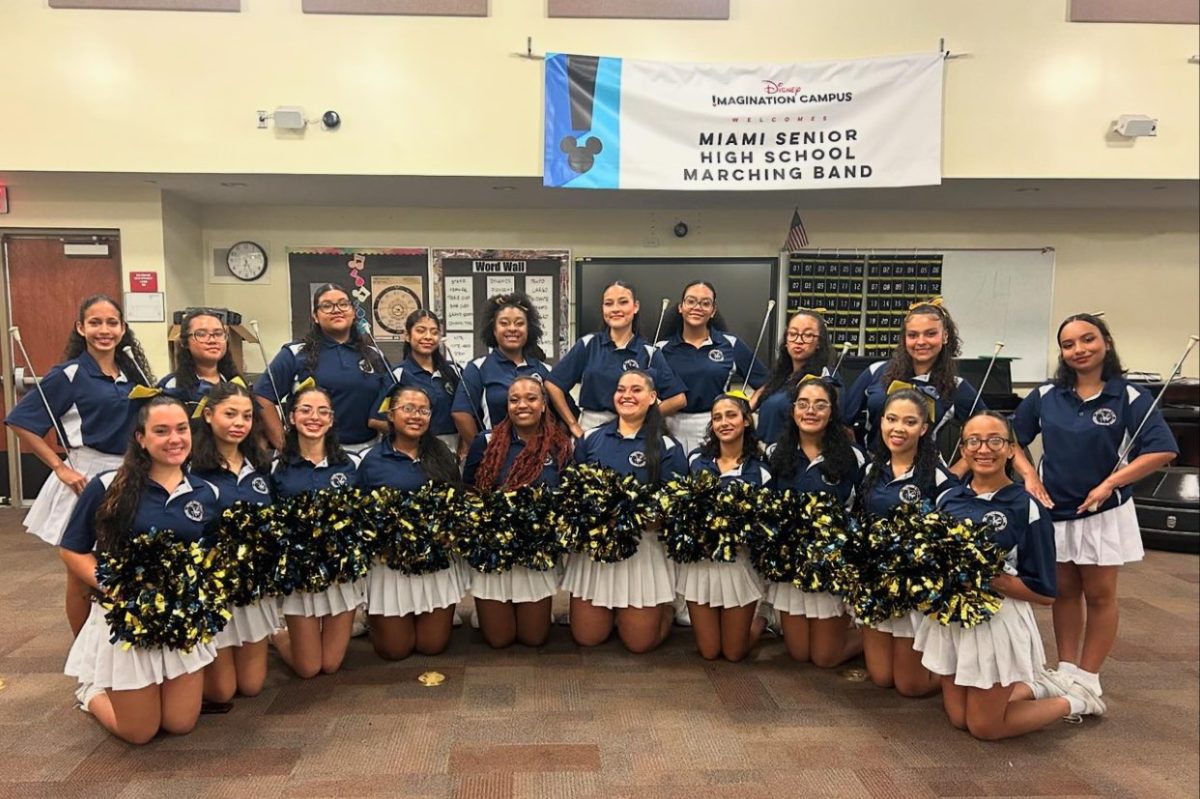New School Gun Laws
Florida governor Rick Scott (R) signs the “Majority Stoneman Douglas High School Public Safety Act” into law, accompanied by parents of victims of the MSD shooting and by legislative leaders. (nbcnews.com)
May 15, 2018
Following the mass shooting that resulted in the deaths of 15 students and 2 staff members at Marjory Stoneman Douglas High School on February 14th earlier this year, many students are concerned that they may not be safe in their own classrooms.
Do you feel safe at school?
Senior Mingli Yactayo said, “The ID checking and gates can only do so much. The campus is just too large and open. Anyone can enter, or climb the gate.”
Junior Andrea Roque said, “I don’t feel safe. From what I’ve seen, the securities aren’t very effective. Kids come in and leave whenever they want.”
Other students felt safe, but had doubts nonetheless. “I do feel safe,” said senior Lu Ona, “but there’s this lurking fear of danger.”
Junior Stephanie Silva said, “I usually feel pretty secure in school, but ever since the shooting at Marjory Stoneman Douglass, I’ve been second guessing my safety.”
New School Safety Law
The Florida State Legislature passed a bill on March 9th titled the “Marjory Stoneman Douglas High School Public Safety Act” that has intensified the discourse on school safety even further. The bill allows for a controversial provision called the “Aaron Feis Guardian Program”, which would arm school security guards, JROTC instructors, athletic coaches, and teachers with experience in the military or law enforcement.
Now, the program is not mandatory. According to the article titled “Here’s What’s in The Florida Gun Bill”, published by CNN, each school district has the right to not participate, and those who do, would do it in cooperation with and under the supervision of their local police department. Even if a school decides to participate, individual staff do have the choice to refuse being armed. Qualified staff members who want to carry a gun must take 144 hours of training.
Reaction at Stingtown
Students and faculty are worried that this bill may put the country down a slippery slope in which guns could become commonplace at school. “It’s hard to feel comfortable around a weapon that could take the lives of so many people in just a minute,” said junior Sherly Ortega. “We also don’t factor in the chances of a teacher snapping and losing their temper and possibly hurting a student.”
Senior Alex Morel disapproves as well. “People get frustrated too easily and accidents can happen,” he said.
“You have to know someone personally before you can trust them with a weapon,” said junior Anthony Figueroa. “I don’t know these security guards, and I don’t know what they might be thinking or going through.”
An anonymous security guard said, “It’s a difficult situation. Let’s say a student somehow gets access to my weapon. Now you have kids being shot with a weapon registered under my name. What good can a pistol do against a shooter or multiple shooters with assault rifles anyways? I personally would choose to not carry a weapon.”
There are those, however, who do approve of the bill, with an element of caution. Senior Angel Martinez said, “Guns are a tool for self-defense, but it varies from person to person. Some people just don’t have what it takes to be effective in those situations.”
Junior Stephanie Silva said, “I’m fine with security possibly being armed, but they’d have to go through training.”
An anonymous teacher said, “Who is going to defend the students in the event a shooting breaks out? As a teacher, it’s your job to protect your students from anyone who seeks to do them harm. You just have to make sure the armed personnel is properly trained, and that there are periods of re-training.”
What Are Other Steps We Can Take?
Although there is clearly a split between those who approve of weapons on school grounds and those who do not, both parties agree there are other steps we can take to make schools safer. Senior Lu Ona said, “There needs to be more security and better mental health services.”
Mingli Yactayo said, “There needs to be better background checks on students enrolling in the school, especially if there’s a known problematic history.”
“There should be closer attention paid to locking gates,” said junior Carol Banegas. “We also need more cops patrolling the school.”
In the end, this talk about arming school personnel won’t matter for now in Dade and Broward counties. According to the article titled “Largest School Districts Skipping Armed Guardians Program” published by The Miami Herald, “The Broward county school boards adopted formal statements opposing the idea of arming school personnel. Miami-Dade Superintendent Alberto Carvalho has also made clear his district’s position, saying anyone who thinks arming educators is a solution is ‘absolutely out of their mind.”






